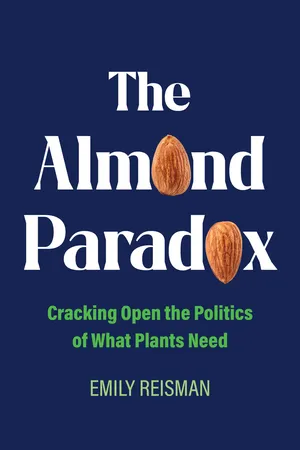
- 187 pages
- English
- PDF
- Available on iOS & Android
eBook - PDF
About this book
A free ebook version of this title is available through Luminos, University of California Press’s Open Access publishing program. Visit www.luminosoa.org to learn more.
Almonds have become a poster crop for agriculture's environmental controversies. Notorious for consuming vast volumes of water and trucking honeybees across the continent, California's almond orchards appear extraordinarily needy. In Spain, however, almond trees have long epitomized the exact opposite: rain-fed resilience. Often planted at the margins of agricultural viability, almonds are championed for their ecological thrift rather than their thirst. How is it that a crop can be known in such radically different ways? The Almond Paradox explores a captivating contrast between divergent ways of knowing not only how much water or pollination almond trees need, but also which trees should be grown and where. Charting the buildup to a global almond boom, the book exposes how situated histories of capitalism, land, science, and the state profoundly shape the most fundamental ways of understanding agriculture. A recognition of knowledge as place based further reveals how seemingly placeless efficiency deepens ecological precarity.
Almonds have become a poster crop for agriculture's environmental controversies. Notorious for consuming vast volumes of water and trucking honeybees across the continent, California's almond orchards appear extraordinarily needy. In Spain, however, almond trees have long epitomized the exact opposite: rain-fed resilience. Often planted at the margins of agricultural viability, almonds are championed for their ecological thrift rather than their thirst. How is it that a crop can be known in such radically different ways? The Almond Paradox explores a captivating contrast between divergent ways of knowing not only how much water or pollination almond trees need, but also which trees should be grown and where. Charting the buildup to a global almond boom, the book exposes how situated histories of capitalism, land, science, and the state profoundly shape the most fundamental ways of understanding agriculture. A recognition of knowledge as place based further reveals how seemingly placeless efficiency deepens ecological precarity.
Frequently asked questions
Yes, you can cancel anytime from the Subscription tab in your account settings on the Perlego website. Your subscription will stay active until the end of your current billing period. Learn how to cancel your subscription.
No, books cannot be downloaded as external files, such as PDFs, for use outside of Perlego. However, you can download books within the Perlego app for offline reading on mobile or tablet. Learn more here.
Perlego offers two plans: Essential and Complete
- Essential is ideal for learners and professionals who enjoy exploring a wide range of subjects. Access the Essential Library with 800,000+ trusted titles and best-sellers across business, personal growth, and the humanities. Includes unlimited reading time and Standard Read Aloud voice.
- Complete: Perfect for advanced learners and researchers needing full, unrestricted access. Unlock 1.4M+ books across hundreds of subjects, including academic and specialized titles. The Complete Plan also includes advanced features like Premium Read Aloud and Research Assistant.
We are an online textbook subscription service, where you can get access to an entire online library for less than the price of a single book per month. With over 1 million books across 1000+ topics, we’ve got you covered! Learn more here.
Look out for the read-aloud symbol on your next book to see if you can listen to it. The read-aloud tool reads text aloud for you, highlighting the text as it is being read. You can pause it, speed it up and slow it down. Learn more here.
Yes! You can use the Perlego app on both iOS or Android devices to read anytime, anywhere — even offline. Perfect for commutes or when you’re on the go.
Please note we cannot support devices running on iOS 13 and Android 7 or earlier. Learn more about using the app.
Please note we cannot support devices running on iOS 13 and Android 7 or earlier. Learn more about using the app.
Yes, you can access The Almond Paradox by Emily Reisman in PDF and/or ePUB format, as well as other popular books in Politics & International Relations & Agricultural Public Policy. We have over one million books available in our catalogue for you to explore.
Information
Table of contents
- Cover
- Series
- Title page
- Copyright
- Subvention
- Contents
- Acknowledgments
- Introduction: Naturalized Extraction and Knowing Otherwise
- 1. Matter: Meaning-Making in a Nutshell
- 2. Flow: Knowing Plant-Water Relations
- 3. Symbiosis: Producing Pollinator Dependence
- 4. Space: Creeping Toward Precarity
- 5. Conjuncture: Rooting Agricultural Knowledges in Place
- Notes
- Bibliography
- Index